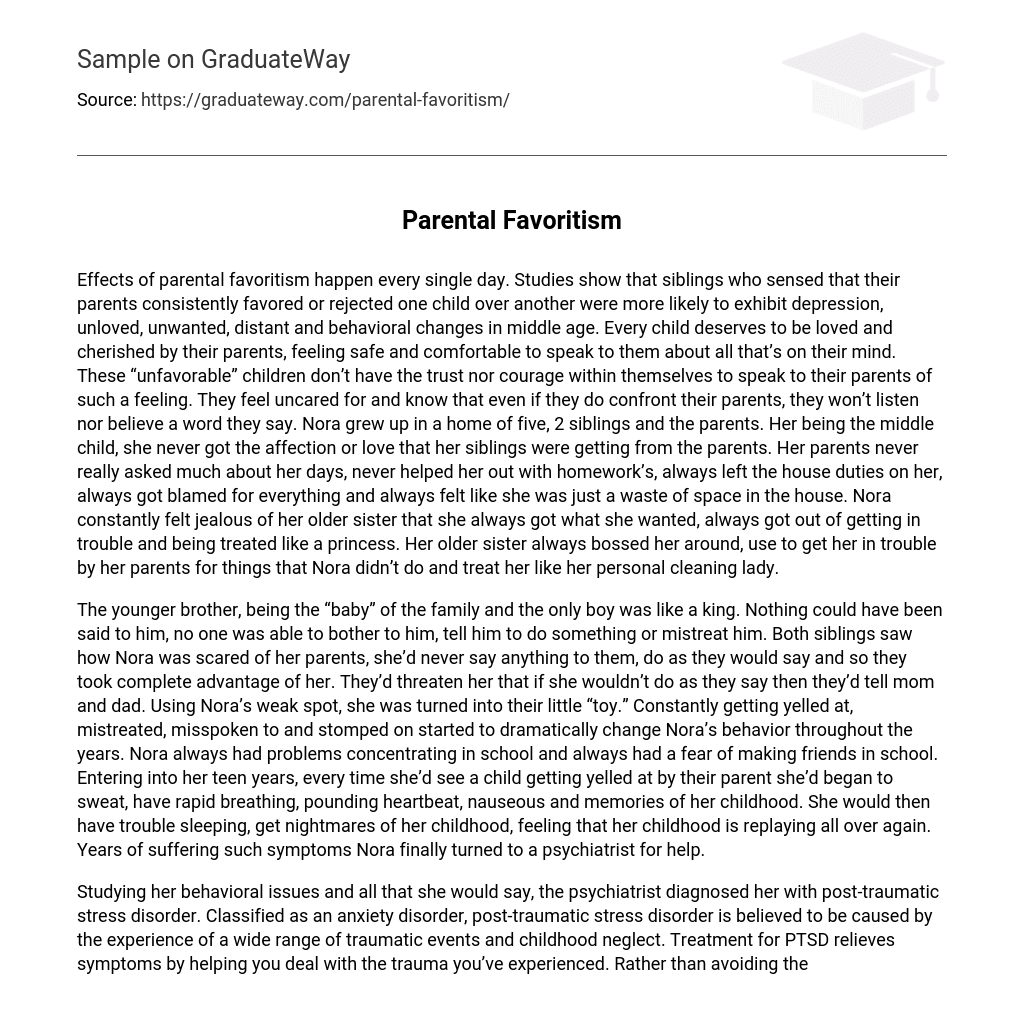Effects of parental favoritism happen every single day. Studies show that siblings who sensed that their parents consistently favored or rejected one child over another were more likely to exhibit depression, unloved, unwanted, distant and behavioral changes in middle age. Every child deserves to be loved and cherished by their parents, feeling safe and comfortable to speak to them about all that’s on their mind. These “unfavorable” children don’t have the trust nor courage within themselves to speak to their parents of such a feeling. They feel uncared for and know that even if they do confront their parents, they won’t listen nor believe a word they say. Nora grew up in a home of five, 2 siblings and the parents. Her being the middle child, she never got the affection or love that her siblings were getting from the parents. Her parents never really asked much about her days, never helped her out with homework’s, always left the house duties on her, always got blamed for everything and always felt like she was just a waste of space in the house. Nora constantly felt jealous of her older sister that she always got what she wanted, always got out of getting in trouble and being treated like a princess. Her older sister always bossed her around, use to get her in trouble by her parents for things that Nora didn’t do and treat her like her personal cleaning lady.
The younger brother, being the “baby” of the family and the only boy was like a king. Nothing could have been said to him, no one was able to bother to him, tell him to do something or mistreat him. Both siblings saw how Nora was scared of her parents, she’d never say anything to them, do as they would say and so they took complete advantage of her. They’d threaten her that if she wouldn’t do as they say then they’d tell mom and dad. Using Nora’s weak spot, she was turned into their little “toy.” Constantly getting yelled at, mistreated, misspoken to and stomped on started to dramatically change Nora’s behavior throughout the years. Nora always had problems concentrating in school and always had a fear of making friends in school. Entering into her teen years, every time she’d see a child getting yelled at by their parent she’d began to sweat, have rapid breathing, pounding heartbeat, nauseous and memories of her childhood. She would then have trouble sleeping, get nightmares of her childhood, feeling that her childhood is replaying all over again. Years of suffering such symptoms Nora finally turned to a psychiatrist for help.
Studying her behavioral issues and all that she would say, the psychiatrist diagnosed her with post-traumatic stress disorder. Classified as an anxiety disorder, post-traumatic stress disorder is believed to be caused by the experience of a wide range of traumatic events and childhood neglect. Treatment for PTSD relieves symptoms by helping you deal with the trauma you’ve experienced. Rather than avoiding the trauma and any reminder of it, treatment will encourage you to recall and process the emotions and sensations you felt during the original event. In addition to offering an outlet for emotions you’ve been bottling up, treatment for PTSD will also help restore your sense of control and reduce the powerful hold the memory of the trauma has on your life.





